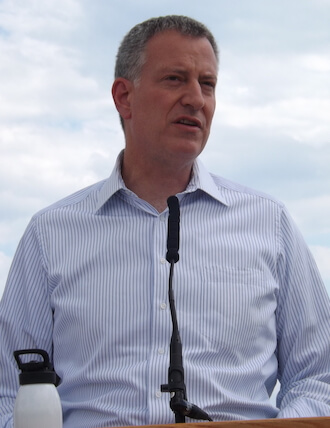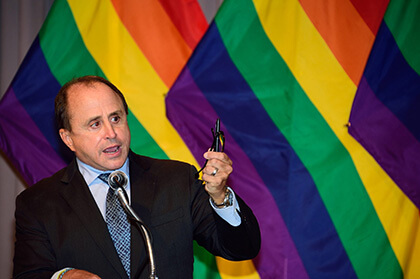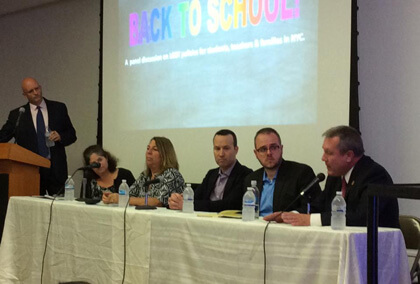Anthony Weiner sports American and Rainbow Flags, an HRC badge, and white pants in the 2013 LGBT Pride Parade in Manhattan. | GAY CITY NEWS
BY PAUL SCHINDLER | Politically powerful voices in New York, Anthony Weiner insisted, are not happy that he’s running for mayor –– and that’s a good thing.
“It’s fairly clear I make the big institutional forces of the city batty,” he told Gay City News and its sister publications at NYC Community Media in an interview that ran to just over an hour on August 9. “I’ve basically said I don’t give a shit and it makes them crazy. I mean, look how crazy the New York Times is.”
The Times, he argued, has found about five different ways to press him to get out of the race.
Former congressman wears establishment’s disdain as badge of honor
But in a city where affordable housing opportunities are scarce, hospitals are closing, public school education remains a divisive political football, and public employee union contracts are long overdue for what could prove costly renegotiation, Weiner made a virtue of the establishment’s disdain for him.
“If you are going to construct a campaign based on the right ideas, good ideas, and you are unencumbered by the collection of contracts, in a political sense, you have to make in what campaigns do, you’re free to say and do the right thing,” the former six-term-plus Brooklyn-Queens Democratic congressman said. “That the very idea that I don’t have the institutions rallying to my side is the reason I’ll be able to more successfully negotiate for these things that I think everyone agrees, if they’re really honest with themselves, need to be done.”
Less than a month before the Democratic mayoral primary, Weiner has little choice but to play the iconoclastic outsider. The married father of a young infant resigned his office in June 2011 after an embarrassing sexting scandal about which he initially lied. He entered this year’s race –– his second run for mayor, after an unsuccessful 2005 primary bid against former Bronx Borough President Fernando Ferrer –– only in late May, at which point major endorsements from labor, elected officials, and Democratic clubs were already locked up. Though voters initially appeared willing to give Weiner a second chance –– he topped several polls in June –– revelations in late July that his sexting behavior continued for well over a year after his resignation caused his numbers to tumble.
A poll conducted by Quinnipiac University August 7-12 put his support among likely primary voters at just 10 percent, a level less than half of that enjoyed by three of his competitors.
The controversy swirling around a candidate with “a funny name [who’s] done embarrassing things,” Weiner said, has allowed the media to ignore serious issues in favor of superficial fluff that reflects “lazy reporting.” The Times, he said, dogged him for the color of his pants at a candidate debate at which he arrived after attending a gay pride event. (His choice in colors for pants is an issue since picked up by the Daily News, New York magazine, the Daily Beast, and the Huffington Post.)
Weiner, however, voiced no greater happiness with the coverage he’s getting on matters of greater substance. Asked about a June 12 Times story that reported that many who followed his years in Congress viewed him as “a lawmaker with little patience for making laws and a single-minded focus on generating attention so he could run for mayor of New York… whose restlessness could spill into recklessness,” Weiner charged the piece was “factually wrong,” “misunderstands Congress,” and “was driven by a basic contempt for someone who has tried to do things differently.”
The newspaper, he said, either denigrated or ignored work he accomplished to expand federal government spending on DNA testing by local police, to establish Superfund status for the Newtown Creek that separates Brooklyn and Queens, and to fortify those two boroughs against storm surge by protecting the Belt Parkway and restoring marshlands in Jamaica Bay. The story, he said, “dismisses as the job of a congressman the idea that you deliver for New York City.”
Harping on the number of bills he got passed, Weiner asserted, is a misreading of the reality of gridlock in Washington.
“LBJ wouldn’t be fucking LBJ today,” he said.
Throughout the interview, Weiner portrayed himself as a bold independent willing to look beyond the opposing poles of conventional political debates. A supporter of a single payer health care system for New York City residents, he also believes that municipal employees must step up to bear a portion of the burden of their current plans. Saying he is an “agnostic” on charter schools, Weiner said there are more pressing debates to be had over public education.
The city, he said, lacks an “affordable housing ladder” for the middle class, and he distinguished himself from other candidates by endorsing greater density in public housing locations, so long as that focuses on greater availability for seniors. At the same time, he declared himself a “pro-development Democrat” in an environment where most recent development has been seen as shortchanging affordable housing.
“I believe we need to grow the city,” he said. “I want to create jobs.”
And even as he showed off his CitiBike membership key, Weiner declared of bike path advocates, “There is also this jihadist mentality that is not going to play with me.”
On police-community relations, he said the city needs a new mayor and a new police commissioner but voiced opposition to the appointment of an inspector general or to City Council legislation that would give citizens a private right to bring legal action against the NYPD.
“I don’t believe in creating government bureaucracies to solve a problem that elections are supposed to solve,” Weiner said. “I think we sometimes deal with problems by blurring lines of authority rather than making them sharper.”
Saying that there are already checks in place against abusive police behavior, he said, “An individual right of action doesn’t make us safer… it makes us more litigious.”
Weiner voiced particularly strong opposition to the city’s current policy, under court challenge, barring religious groups from renting public school space on weekends to hold worship services. “Government,” he said, “in its desire to observe the lines between church and state, often goes beyond and becomes anti-religion. I don’t see anything wrong with empty classrooms that are rented at market value going to a religious organization.”
Asked whether church-state conflicts aren’t inevitable when many congregations have used the schools in the past to preach anti-gay messages, Weiner responded, “It is beyond ridiculous to say [my] position means that I support every word that is said or every organization that then takes advantage of that.” Making determinations based on content, he warned, “would be the worst possible thing to do” –– though the current policy is blanket and not based on specific content.
A Bloomberg administration policy that regulated a form of circumcision used in the Orthodox Jewish community that has the mohel suck the blood from the newly circumcised penis, he said, demonstrates a similar “elitism.” According to Weiner, the implementation of that policy, which governs a practice in which 13 newborns have been infected with herpes in the city, leading to two deaths, was “entirely about dictating to a discrete minority community.”
Weiner’s willingness to make his points in colorful fashion was apparent right from the start of the interview. Asking about the state of NYC Community Media’s business, which includes four Lower Manhattan neighborhood newspapers in addition to Gay City News, he described such locally focused publications as “the cockroaches” of the media world. But that, too, was a good thing.
“The more neighborhoody the newspaper, the better,” he said. “The more likely they are to be successful.”





































